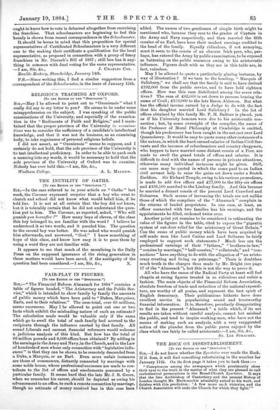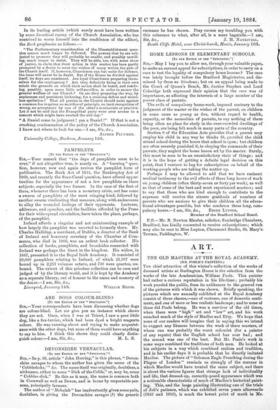THE BOCK ON DISESTABLISHMENT. [To THE EDITOR OF THE ''SrzcrATOR.1
SIR,—I do not know whether the Spectator ever reads the Rock. If it does, it will find something entertaining in the number for January 11th. On its first page it takes you to task thus :— " Conspicuous among the newspapers which persistently close their eyes to the truth in the matter of what they are pleased to call ecclesiastical persecutions is the Broad-Church Spectator. It says that the late Archbishop of Canterbury and the present Bishop of London thought Mr. Mackonochie admirably suited to his work, and finishes with this prediction; 'A few more such victories, and the Church Association will undo the Church for which they fight." In its leading article (which surely must have been written by some Jesnitical enemy of the Church Association, who has contrived to worm himself into the confidence of the editor), the Rock prophesies as follows :— " The Parliamentary consideration of the Disestablishment ques- tion cannot much longer be deferred. The powers that be are sub- jected to pressnre they will probably be unable, and possibly unwill- ing, much longer to resist. They will be able, too, with some show of justice, to claim that their action in this matter has been partly prompted by a desire to meet the wishes of many within the pale of the Church itself. If, however, Churchmen can but unite for defence, the issue will never be in doubt. But if the House be divided against itself, its days are numbered. Are loyal Churchmen preparing them- selves for the contingency ? Are they definitely fixing in their own minds the grounds on which their action shall be based, and resolv- ing, possibly, upon some little self-sacrifice, in order to secure the general welfare of our Church ? Or are they preparing the way, by supineness and persistent bickering, for a crushing defeat and merci- less spoliation? That all parties in the Church should unite against a common foe requires no sacrifice of principle, no tacit recognition of wrong, no acceptance by one of the other's sentiments or practice. Let it not be said that the Evangelical party were over averse to a concert which might have averted the evil day."
"A Daniel come to judgment ! yea a Daniel !" If that is not a crushing condemnation of the policy of the Church Association, I know not where to look for one.—I am, Sir, etc.,
ALFRED PLUMMER.
University College, Durham, January 14th.



































 Previous page
Previous page